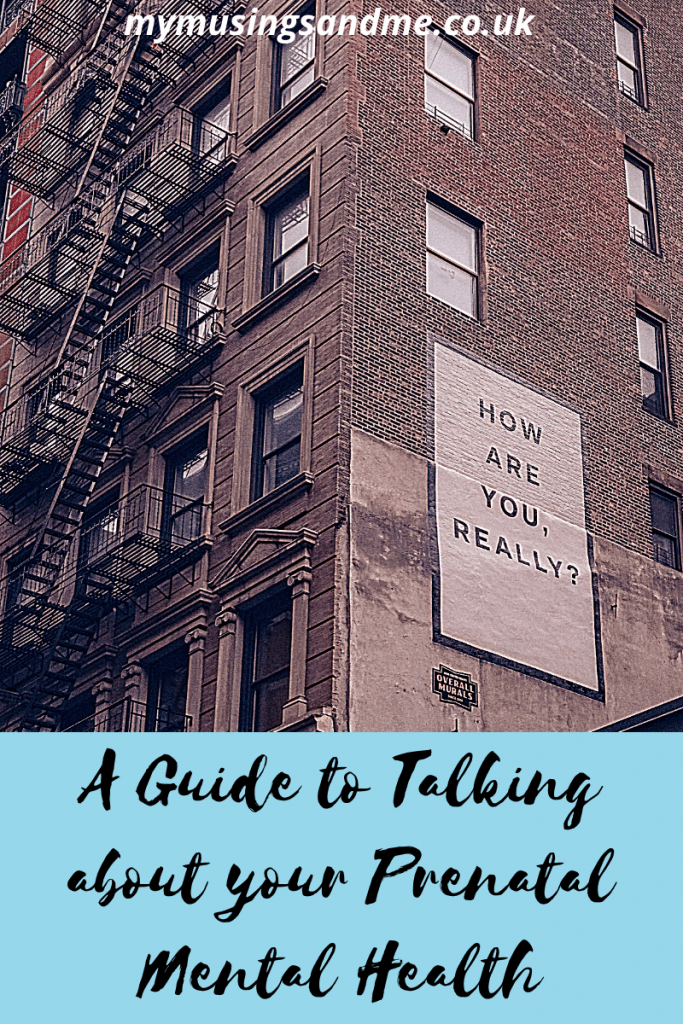I needed time for the news that we were pregnant to sink in. Once it had, I knew I’d have to keep an eye on my mental health. Both prenatal and postnatal. Even before we were pregnant, when we decided to try, I was aware of the implications for myself. With a history of both anxiety and depression I knew I was at a higher risk for post-natal depression after the birth. As well as the possibility of higher anxiety levels during my pregnancy and after which could impact the baby.
For a few years after marriage I was hesitant to even consider starting a family. Concerned that my past history would negatively impact my ability to parent. And the fear that I wasn’t ready to parent. Too busy trying to sort out my mental health to take on looking after another person who would be completely reliant on me. As well as, what my prenatal mental health might look like?
For more on my experiences with depression read here.
For more on how I learnt to understand my anxiety read here.
Prenatal Mental Health Challenges
Due to my awareness of possible prenatal mental health challenges, I was hyper vigilant around my prenatal mental health. This became complicated early on due to my experience with hyperemesis gravidarum; a severe form of morning sickness. Unfortunately, my experience with anxiety revolves around severe nausea and vomiting as a reaction of my fight, flight and freeze response. So, any similar symptoms can spike my stress levels. Not exactly plain sailing for my first few months. As my morning sickness began to ease around 16 weeks, my next challenge hit. Covid-19 and lockdown began. The effects of which we’re still feeling today. Again, not exactly how I imagined my pregnancy and definitely providing extra challenges to my prenatal mental health.
For more on pregnancy during Covid-19 read here.
The Importance of Talking
Despite the hurdles, I managed my mental health well in those challenging months. On reflection, the most helpful thing I did was to talk about my mental health and my concerns. And keeping a firm eye on my prenatal mental health and planning accordingly.
Telling My Partner
The first person I shared my fears with was my partner. This was important as historically I’d always managed alone and had not told people when I was struggling. I feared that if my symptoms re-appeared I’d follow this toxic pattern and deprive myself of the support structures I desperately needed. Our conversation was important for me to acknowledge that not only might I need help in the future. But to highlight what it could look like if my anxiety or depression returned. And encourage my partner to express his concerns with me if he saw the signs rather than relying on me to tell him. Included in this discussion, we thought about how he could raise any concerns with me and how it would be best to do so.
Telling My Midwife
The second step was telling my midwife. At my 8-week appointment I ticked off the relevant diagnoses on my medical form. But also bought them up in conversation. I expressed my concerns that my mental health could suffer in the prenatal and postnatal period. And I asked what support options I could access. The midwife was fantastic and incredibly reassuring. She spoke me through options to access additional midwife appointments if I wanted them. As well as talking me through accessing extra support from the perinatal mental health team including extra home visits after birth to check on me and ensure my mental health wasn’t declining. Simply knowing I could access extra appointments specifically about my mental health if needed was a massive relief. I needed to know that people would be keeping an eye on my mental health in case I neglected it myself.
All women should be asked about their mental health during check ups following the birth of their baby. A study reported by the Royal College of Obstetrics and Gynaceology suggest that 1 in 5 women develop a mental health problem during their pregnancy or within a year of birth. But, if no-one asks you or things change, don’t hesitate to bring it up yourself. Your prenatal and postnatal appointments are about both you and your baby. I think this message is particularly critical because when you’re pregnant the focus switches from you to your baby. When this happens it’s easy for your own health; both physical and mental to be forgotten.
Time to Talk (Again)

As Covid-19 looked like it was here to stay, I reached the penultimate weeks of pregnancy and began to worry about my stress levels. With Covid-19 still a reality I feared that the support options I might need may have disappeared with the pandemic. This all came to a head at my 36-week appointment. Expressing my concerns about increased stress levels as labour due closer, I burst into tears. I’m not sure who was more surprised, my midwife or myself. I can only assume that verbalizing the fears made them real and overwhelmed me in that moment. And without my partner there it was harder than ever.
Despite my fears my midwife was excellent. Whilst she potentially misunderstood exactly where my fears were stemming from, she spoke me through numerous options I had at my disposal. These included extra midwife appointments up until labour. Even if this meant a weekly appointment if that would help me. I was attending appointments alone due to Covid-19 restrictions, so they suggested home appointments could be helpful so my partner could be present and so I could be in my own familiar space which might help me stay calm.
They also spoke me through the perinatal team options and assured me that they would still be available to me if I required them post-labour. And, likewise, a possible referral to IAPT (Improving Access to Psychological Services) if I felt that would be beneficial. Knowing that there were multiple options, and the midwife’s understanding that some empathy and adjustments could be the difference between increasing or decreasing my anxiety, really helped.
For 4 ways to check in with your mental health read here.
Talking About Prenatal Mental Health
So, my lesson from pregnancy, if you have concerns speak about them. Whether you need a partner, friend, family member or medical professional to be extra vigilant for you. That is ok. I was lucky to not need anyone to keep an eye out for me during my pregnancy. But I easily could have, and might still need it during my postnatal mental health journey. Yet, just knowing that people were looking out for me really helped take the pressure off. It may have made all the difference.
Likewise, do speak to your healthcare professional. You may or may not need the support but you won’t know if it’s there unless you ask. And, if the response isn’t adequate, don’t be afraid to ask to speak to someone else about it. I saw one obstetrician who was incredibly unhelpful. I ended up leaving the appointment early wanting to cry. When I mentioned this to my midwife she offered to support me in making a complaint about the person – I choose not to. But feeling listened to and supported really helped. And it reminded me that one bad experience doesn’t mean that there is no support or understanding out there. Sometimes we need to give it one more try to find someone who can provide what we’re looking for.
What have your experiences of talking about your prenatal mental health been like? Do you think the advice above is helpful? Let us know below!




I really enjoyed this post and I csn definitely tell you that it is not a topic that is talking about enough and it needs to be. Thanks so much for shedding light on prenatal mental health and why it matters.
This is such a raw and honest post! I applaud you for being open about your fears and thoughts. I haven’t been pregnant yet but I do see what anxiety does to pregnant women and it’s not easy by the look on their faces. Women are so brave and powerful! Hope you have a safe delivery. God bless you!
http://www.lifebeginsattwenty.com